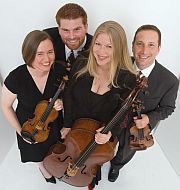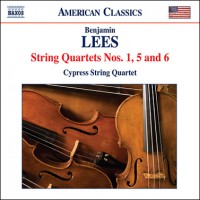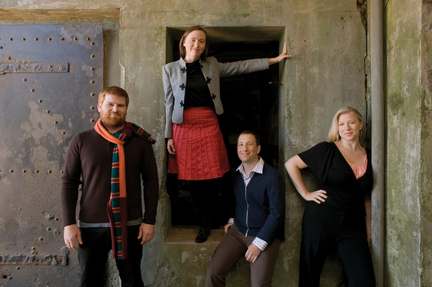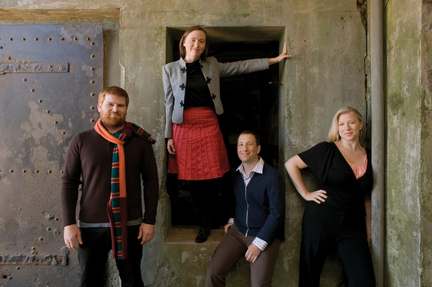EDUCATION PROGRAMS
CSQ Educational Programs Overview
- 150,000 students nationwide
- 30,000 Bay Area Students
- 16 newly commissioned works
- 400 Bay Area school visits
- 2,500 U.S. and International visits
- California Arts Council Exemplary Educator Award
- WQXR Robert Sherman Award for Music Education in New York
- 4 National Endowment for the Arts Awards
Call & Response
- What is Call & Response? coming soon
- History of Call & Response: Over the last 16 years, the Cypress String Quartet has reached over 30,000 students in the San Francisco Bay Area through its annual Call & Response presentations.
- Reaching Public and Private Schools: coming soon
- Suggest a School: Know a program in need? Want to suggest a teacher and schoool who could be an enthusiastic new educational partner? Email natalie@cypressquartet.com to share your ideas with us.
- Call & Response School Partners 2016: coming soon
- School Partners 2000-2015
- San Francisco: Balboa High School, Community Music Center, French American International School, KIPP Bayview Academy, Lincoln High School, Lowell High School, Lycée Française La Perouse, Mission High School, Out-of-Site Afterschool Program, Sacred Heart Cathedral Preparatory, School of the Arts, Thurgood Marshall Academic High School, University High School, Washington High School
- North Bay: Mill Valley High School, Tamalpais High School, Novato Charter School, San Domenico School, Davidson Middle School, Enriching Lives Through Music (E.L.M.), Marin Academy, Miller Creek Middle School
- East Bay: Berkeley High School, Longfellow Middle School, Homestead High School, Monta Vista High School, Corpus Christi School, Edna Brewer idle School, Holy Names University Youth Orchestra, Montera Middle School, Roosevelt Middle School, Thornhill Elementary School, Westlake Middle School, Piedmont Middle School
- Peninsula: Terman Middle School, Menlo School, Nueva School, Independence High School, Leland High School, Lincoln High School, Lynbrook High School, Piedmont Hills High School, Aragon High School, Wilcox High School, Saratoga High School
- 2000—Dan Coleman | quartetto ricercare
- 2001—Anna Weesner | Flux
- 2002—Benjamin Lees | String Quartet No. 5
- 2003—Jennifer Higdon | Impressions
- 2004—Jeffery Cotton | String Quartet No. 1
- 2005—Elena Ruehr | String Quartet No. 4
- 2006—George Tsontakis | String Quartet No. 5
- 2007—Daniel Asia | String Quartet No.3
- 2008—Kurt Rhode | Gravities
- 2009—Kevin Puts | Lento Assai
- 2010—Elena Ruehr | Bel Canto
- 2011—Jeffery Cotton | Serenade
- 2012—Philippe Hersant | String Quartet No. 3
- 2013—Jennifer Higdon | In the Shadow of Sirius
- 2014—George Tsontakis | String Quartet No. 6
- 2015—Philippe Hersant | String Quartet No.4 The Starry Sky
Call & Response Commissions
Over the past 16 years, the Cypress String Quartet has commissioned 16 new works as part of Call & Response program.
Album review: Cypress String Quartet, The American Album (Avie)
Source: The Independent
November 15, 2013
by Andy Gill
This pioneering American quartet here offers razor-sharp interpretations of a fascinating programme of American-themed pieces, starting with Dvorak's String Quartet No 12 in F, the American. It's evocative of a bright new dawn, whereas Charles Tomlinson Griffes's Two Sketches Based on Indian Themes has a more sombre, ethereal tone. read more »
Beethoven: The Late String Quartets
Disc 1
String Quartet in E-Flat Major, Opus 127
String Quartet in A Minor, Opus 132
Disc 2
String Quartet in B-Flat Major, Opus 130
Große Fuge, Opus 133
and Alternate Finale
Disc 3
String Quartet in C-Sharp Minor, Opus 131
String Quartet in F Major, Opus 135
When people discuss the greatest contributions to the arts in Western civilization, names such as Shakespeare, da Vinci, and Beethoven inevitably arise. Proponents for Beethoven cite his five late quartets, which were the final works that he completed. In this three-disc box set, the Cypress String Quartet brings a fresh voice of humanity and clarity to these monumental works.
The final disc completed for this set includes Beethoven's String Quartet in E-flat Major, Opus. 127 and his String Quartet in A Minor, Opus 132. These performances were recorded at Skywalker Sound by engineer Mark Willsher and produced by Cypress first violinist, Cecily Ward.Read Fanfare Magazine's review of this box set
Included in the box set are program notes written by Joseph Kerman, the author of The Beethoven Quartets (W. W. Norton & Company).
In addition to the physical CD, high-resolution, audiophile-quality versions of this album are available for purchase in both 44khz/16-bit and 96khz/24-bit uncompressed .WAV audio formats via artistconnex, powered by Downloads NOW!
Purchase this album direct from the artists at cypressquartet.bandcamp.com
SAMPLES / TRACK LISTING
- Beethoven 127-1 1. String Quartet in E-Flat Major, Opus 127: Maestoso - Allegro 6:05
- Beethoven 127-2 2. String Quartet in E-Flat Major, Opus 127: Adagio, ma non troppo e molto cantabile 14:44
- Beethoven 127-3 3. String Quartet in E-Flat Major, Opus 127: Scherzando vivace 8:54
- Beethoven 127-4 4. String Quartet in E-Flat Major, Opus 127: Allegro 6:47
- Beethoven 132-1 5. String Quartet in A Minor, Opus 132: Assai sostenuto - Allegro 9:49
- Beethoven 132-2 6. String Quartet in A Minor, Opus 132: Allegro ma non tanto 8:32
- Beethoven 132-3 7. String Quartet in A Minor, Opus 132: Molto Adagio - Andante 16:12
- Beethoven 132-4 8. String Quartet in A Minor, Opus 132: Alla marcia, assai vivace 2:14
- Beethoven 132-5 9. String Quartet in A Minor, Opus 132: Allegro appassionato - Presto 6:31
- Beethoven 130-1 1. String Quartet in B-Flat Major, Opus 130: Adagio ma non troppo - Allegro 14:18
- Beethoven 130-2 2. String Quartet in B-Flat Major, Opus 130: Presto 2:07
- Beethoven 130-3 3. String Quartet in B-Flat Major, Opus 130: Poco scherzoso: Andante con moto ma non troppo 7:25
- Beethoven 130-4 4. String Quartet in B-Flat Major, Opus 130: Alla Danza tedesca: Allegro assai 3:57
- Beethoven 130-5 5. String Quartet in B-Flat Major, Opus 130: Cavatina: Adagio molto espressivo 6:34
- Beethoven 133 6. String Quartet in B-Flat Major, Opus 130: Original finale (1825): Grosse Fuge: Overtura - Fuga (Opus 133)15:15
- Beethoven 130-6 7. String Quartet in B-Flat Major, Opus 130: Alternate finale (1826): Finale: Allegro 10:48
- Beethoven 131-1 1. String Quartet in C-Sharp Minor, Opus 131: Adagio ma non troppo e molto espressivo 5:44
- Beethoven 131-2 2. String Quartet in C-Sharp Minor, Opus 131: Allegro molto vivace 3:06
- Beethoven 131-3 3. String Quartet in C-Sharp Minor, Opus 131: Allegro moderato 0:43
- Beethoven 131-4 4. String Quartet in C-Sharp Minor, Opus 131: Andante ma non troppo e molto cantabile-Piu mosso-Andante moderato e lusinghiero-Adagio-Allegretto-Adagio ma non troppo e semplice-Allegretto 14:27
- Beethoven 131-5 5. String Quartet in C-Sharp Minor, Opus 131: Presto 5:19
- Beethoven 131-6 6. String Quartet in C-Sharp Minor, Opus 131: Adagio quasi un poco andante 2:13
- Beethoven 131-7 7. String Quartet in C-Sharp Minor, Opus 131: Allegro 6:58
- Beethoven 135-1 8. String Quartet in F Major, Opus 135: Allegretto 6:41
- Beethoven 135-2 9. String Quartet in F Major, Opus 135: Vivace 3:20
- Beethoven 135-3 10. String Quartet in F Major, Opus 135: Lento assai, cantante e tranquillo 7:17
- Beethoven 135-4 11. String Quartet in F Major, Opus 135: Grave ma non troppo tratto - Allegro 6:56
Disc 1 [Opus 127 and Opus 132]
Disc 2 [Opus 130 and Opus 133]
Disc 3 [Opus 131 and Opus 135]
Fanfare Magazine Review
Sep.4, 2012
First, bravo! Another modern-day ensemble acknowledges the importance of placing the B♭-Major Quartet’s Grosse Fuge ahead of the alternate finale. The resisters, like the recently reviewed Shanghai Quartet, are in an ever-growing minority, one that, in my opinion, deserves to be discredited.
Second, bravissimo! The Cypress String Quartet’s traversal of Beethoven’s late quartets is the best, bar none, I’ve yet to encounter. These are performances of a technical perfection and keenness of interpretive insight that one is apt to hear only in the mind’s inner ear. Tiny details seen in the score but almost never heard are revealed with crystalline clarity. For example, in the opening Adagio measures of the B♭-Major Quartet, how often does one actually hear the C-G double-stop in the viola part on the upbeat to the sixth full bar? Yet here it is, as clear as can be, to no small degree the result of the Cypress Quartet players’ scrupulous observance of every one of Beethoven’s crescendo swells to a p and a recording of unusual penetrability.
But there’s something that goes way beyond following the composer’s dynamic and phrasing instructions or taking the lengthy exposition repeat, and it has to do with a musical intuition and vision of the work that, frankly, strikes me like a bolt of lightning. Every one of the quartet’s six movements, including the Grosse Fuge (seven if you count the alternate finale), and not just the Alla Danza , is played as if it were a dance. As many times as I’ve heard this quartet, it never before occurred to me that it’s as much an “apotheosis of the dance” as is the composer’s Seventh Symphony. Each of the quartet’s movements is informed by a stylized dance form of one type or another. The first movement opens with a stately entrée grave in 3 and then proceeds to alternate with a lively, vigorous, bounding type of dance in 4, perhaps a galliard. The second movement (Presto) in cut time might easily have its roots in the tarantella. The third movement (Poco scherzoso) bears certain characteristics of a gavotte. The fourth movement (Alla Danza) is a sad little Viennese waltz. The fifth movement (Cavatina) is, of course, the quartet’s sarabande, and the alternate finale could well be a rigaudon or tambourin. That leaves the Grosse Fuge , which in this context now becomes all important and lays claim to its hierarchical position as the quartet’s rightful conclusion, for it embodies all of the dance impulses that precede it. When you listen to the Cypress Quartet play this work, you will hear Beethoven’s B♭-Major Quartet as the dance suite it probably is, and you will quite literally hear the music dancing.
This is a very special performance, but it’s not the only one. The A-Minor Quartet’s great “Heiliger Dankegesang” is of a transfixing concentration and intensity that will melt your heart and bore a hole through your soul. And again, the combination of the ensemble’s clarity of voicing and the transparency of the recording expose every tiny scrap of filigree in the contrasting andante sections of the movement. This is music-making that will hold you absolutely spellbound in its thrall.
If reverence and awe, then joyful embrace, are Beethoven’s vision of a personal God in the “Heiliger Dankegesang,” what vision does he impart in the cold, impersonal, remote, and alien cosmogony of the C♯-Minor Quartet’s opening fugue? Is it that of Schubert peering into the dark, fathomless abyss? No, it’s the vision, rather comforting in its own way, of a universe neither benevolent nor malevolent, but unmindful of us and unfolding as it should. The key to capturing the essence of this music is not to play it devoid of expression but to play it with an expression that expresses expressionlessness. This the Cypress Quartet achieves with a feeling of aloofness and detachment conceived most immaculately.
Exothermic vs. endothermic—all-embracing warmth vs. calculated cold in the two preceding quartets. Where does Beethoven go from here? To foppery and tomfoolery in the final F-Major Quartet, a work filled mostly with good-natured humor and a generosity of spirit. But there remains the quartet’s Lento assai, a movement that, with its concluding autistic suspensions repeated over and over again, foretells the Mahlerian leave-taking—“ewig … ewig … ewig”—at the end of Das Lied von der Erde.
From my very first encounter with the San Francisco-based Cypress String Quartet in 33:2, I knew this was not just another string-quartet ensemble, that this was a group of special talent that was marked for greatness. I noted then the awesome technical resources and communicative expressiveness of these players and singled them out as my then current favorites in this repertoire. Nothing has changed since I made those statements. If anything, the completion of this set of Beethoven’s late quartets with the Nos. 12 and 15 has only reinforced my feelings. I would now pick the Cypress String Quartet over the Cleveland, Emerson, Artemis, Endellion, and Takács quartets and the Tokyo Quartet’s recent remake. It will now be a shame, and a major disappointment, if the Cypress String Quartet does not complete its Beethoven cycle with the early and middle quartets. This is potential Want List material and urgently recommended.
Jerry DubinsBack to Discography
The American Album (2011)
Dvorak's beloved "American" Quartet and Barber's String Quartet with its famous Molto adagio central movement share the program with "Two Sketches Based on Indian Themes" by Charles Griffes. A stunning look at the American spirit from 1893-1936. Comes in a brand new shrink-wrapped digipak case including booklet insert with original liner notes written by Marc Geelhoed.SAMPLES / TRACK LISTING
- Dvorak 1 1. Dvorak: String Quartet No.12 in F Major, Op.96 "American" - Allegro ma non troppo 8:58
- Dvorak 2 2. Lento 6:19
- Dvorak 3 3. Molto vivace 3:43
- Dvorak 4 4. Vivace ma non troppo 5:26
- Griffes 1 5. Griffes: Two Sketches Based on Indian Themes - Lento e mesto 6:29
- Griffes 2 6. Allegro giocoso 3:32
- Barber 1 7. Barber: String Quartet in B Minor, Op.11 - Molto allegro e appassionato 7:45
- Barber 2 8. Molto adagio 7:18
- Barber 3 9. Molto allegro (come prima) - Presto 2:14
Reviews
Examiner.com
11/16/2011
by Stephen Smoliar, Classical Music Examiner
Last week saw the release by the Cypress String Quartet (violins Cecily Ward and Tom Stone, viola Ethan Filner, and cello Jennifer Kloetzel) of their latest CD on their own label. The recording is entitled The American Album; and it provides three markedly different perspectives on what we might call “American” music from three decidedly different eras of our country’s history. What makes those perspectives interesting, however, is that each of them has its own form of European connection. Read more...
Demon Barber of That Adagio
San Francisco Classical Voice
December 13, 2009
By Michelle Dulak Thomson
Most schools of music host concert series, not only by their own students and faculty but also by local (or even visiting) artists: What better way to keep the students inside in touch with the professional music community outside? But the Crowden Music Center's "Sundays@4" series, as befits the CMS' community-centered mission, has little of the conservatory feel about it.

The performance space is smallish and informal, the atmosphere relaxed, and the tickets cheap (tickets are free for children under 18). The recitals I've attended, by Crowden alumni, faculty, and other Bay Area–based musicians, have been formidable in musical level but nothing else. The vibe is positively neighborly.
read more »Lees: String Quartets 1, 5 & 6
Sequenza 21
Posted by Phil Muse in Naxos
Dec 07, 2009

Quartet No. 1 (1952)
Quartet No. 5 (2002)
Quartet No. 6 (2005)
Cypress String Quartet
Naxos
American composer Benjamin Lees (b.1924) has a recognizable, highly personal style, notable for his formal clarity, his sonorities, his love of sharp contrasts and conflicts, his unexpected lyricism, and the integrity of his writing. As one can tell from a glance at the above dates, Lees has had an unusually long mature period, continuing to write music of remarkable vitality at an age when most composers have experienced a drying of creative juices, diminished stamina, or both.
read more »Quartet embraces classic, contemporary works
Rockford Register Star
By Nat Bauer
November 2, 2009
The 125th-anniversary concert season of the Mendelssohn Performing Arts Center continued this past Friday evening at the Court Street United Methodist Church with a stellar performance by the Cypress String Quartet.
Violinists Cecily Ward and Tom Stone, violist Ethan Filner and cellist Jennifer Kloetzel have become world recognized as a premier string quartet, known for their power, passion and precision in presenting classic chamber music yet welcoming contemporary commissioned works.
Kloetzel introduced the first work, Mendelssohn-Bartholdy's "String Quartet in A Minor, Op. 13," also known as the "Ist es Wahr?" ("Is it True?")
With a subdued adagio opening introducing the three-note theme, the movement emerges into a dynamic allegro, enabling the players to display their technical skill, mastery in tonal color and absolute precision in articulation.
read more »BEETHOVEN String Quartets: No. 14 in c♯; No. 16 in F
Fanfare
November 2009
BEETHOVEN String Quartets: No. 14 in c♯; No. 16 in F • Cypress String Quartet • (60:21)
I rather pride myself on keeping abreast of string quartet ensembles, so it was with some consternation that I found myself unfamiliar with the Cypress String Quartet, which has been around since 1996, only to discover that three of their CDs have been previously reviewed in these pages. To make matters worse, I learned that the CSQ is a San Francisco based group that was formed while I was still living there. Prior albums have appeared on commercial, if not exactly mainstream labels except for a release on Naxos of works by American composer Jennifer Higdon. This latest release is an enterprise underwritten by The William and Flora Hewlett Foundation, an organization that sponsors and promotes educational, cultural, and public broadcasting institutions. The CD bears no catalog number, but it is designated as Volume 1, suggesting the inauguration of a new Beethoven quartet cycle by the CSQ. If so, it seems a rather odd place to start, with two of the composer's last works, but no matter. It's not where one starts, but where one ends up that counts. The members of the ensemble—Cecily Ward and Tom Stone, violins; Ethan Filner, viola; and Jennifer Kloetzel, cello—have at their disposal a collection of exceptional instruments: violins by Stradivari (1681) and Carlo Bergonzi (1733), a viola by Vittorio Bellarosa, (1947) and a cello by Hieronymus Amati II (1701). The Strad, Bergonzi, and Amati have been brought up to modern standards, of course, as these are not period-instrument performances.
read more »New & Noteworthy: The Masterworks Edition
Strings
November 2009
Beethoven Late Quartets, Vol 1 (cypressquartet.com). The Cypress String Quartet begins its Beethoven cycle with a gorgeous reading of String Quartet in C# minor , Op. 131, and String Quartet in F major, Op. 135.
BEETHOVEN: Quartets 14+16
American Record Guide
November/December 2009
Cypress Quartet
Cypress 1-63 minutes
(912 Cole St Apt 137, San Francisco, CA 94117)
The Cypress Quartet was founded in 1996 and is based in San Francisco. This is their own label, but it is easily found. This is Volume I of what is to be a set of the late quartets; the others are due in 2010 and 2011.
This is a very fine group-technically excellent and, I would say, American in approach. Many European groups bring a sense of pain, world-weariness, and reverence to late Beethoven; but here I find confidence and a willingness (and ability) to face Beethoven head-on. The sound is uncommonly fine: rich and beautifully balanced, with violinist Cecily Ward extraordinarily sweet above the staff.
read more »Cypress Quartet plays flawless classical music on the strings
St. Louis Examiner
November 1, 2009
By Bill Townsend
About 75 people got a post-Halloween treat Sunday afternoon at the Touhill Performing Arts Center on the campus of the University of Missouri-St. Louis.
The world-renowned Cypress String Quartet performed a heartfelt, flawless concert of three works, and, before each piece, they took the time to explain both the music they played and the processes they go through in preparing to play.
In short, it was an hour and 45 minutes of learning and entertainment, well-presented by an industrious, gifted foursome who are welcome back to these environs any time.
The quartet, named after a love cycle of 12 string quartets by Antonin Dvorak, lovingly played two of the greatest chamber pieces ever created for strings, plus a new, one-movement quartet inspired by the other two on the program from the early 19th century.
read more »Ludwig Lite
Navigator Entertainment
November/December 2009

On Beethoven Late Quartets, Volume 1, San Francisco's youthful Cypress String Quartet tackles works most ensembles reserve for later in their careers. The result: sunny and limber readings of quartets in C-sharp minor (Opus 131) and F major (Opus 135).
String quartet to perform tonight
Daily Kansan
By Daniel Johnson
October 28, 2009
Tom Stone's creative impulses surge when he plays violin at the Lied Center. He loves the way the notes sound in the building.
"You can do anything with sound in that room," Stone said. "We can make the softest whisper on our violins or create a really strong and forceful sound."
Stone, a violinist with the Cypress String Quartet, will perform at 7:30 p.m. tonight in the Lied Center. The performance will be a unique one for the group, which is playing in more than 90 venues this year. The quartet will perform an original piece commissioned by the Lied Center and the Library of Congress for only the second time.
The group will perform "Lento Assai," a project financed in part by the Lied Center. The work is a product of the quartet's annual "call and response" series. For the series, the quartet enlists a contemporary composer to create a musical reaction to major classical works. The pieces are composed specifically for the quartet to perform.
read more »Interview with the Cypress Quartet
Tokafi
October 8th 2009
By Tobias

For a long time, multitasking and classical music seemed like contradictions in terms. Quite obviously, then, the times they are achanging: "There was a CD release party for our first volume of Beethoven Quartets this past week and we are about to head into the recording studio again", the members of the Cypress String Quartet enthuse, "plus we're madly rehearsing for our upcoming season! Never a dull moment..." Never a dull moment - it seems like the perfect description of their latest album, the first of a trilogy of releases documenting Beethoven's entire repertoire for String Quartet. As with previous CDs and, in fact, their entire career, the Quartet have taken care of every single piece of the puzzle: From deciding upon the repertoire and organising concerts to recording the album at Skywalker Studios. To them, all of these tasks, often dreaded by most of their colleagues, are an integral part of the creative process. It is only by dealing with them personally, that they are truly expressing themselves fully as artists. In San Francisco at the time of this interview, the Cypresses are currently busy finishing up their second Beethoven disc, which is scheduled for next summer and will feature the Opus 130 Quartet with both the Grosse Fuge ("Op. 133, for those of you keeping score" as they point out) and the revised Finale movement. But there's more: "We're also learning and rehearsing music for the upcoming season, including FOUR new commissions! It's exciting to play the masterpieces, AND be ushering new music into the world." Does that sound like a lot on their plate? Even if so, the Cypress Quartet have learnt to deal with multitasking long ago.
read more »Disturbances don’t phase Cypress Quartet in Montevallo, Ala., concert
Alabama Live
By Michael Huebner -- The Birmingham News

Four stars out of five
CYPRESS STRING QUARTET
Cecily Ward and Tom Stone, violinists; Ethan Filner, violist; Jennifer Kloetzel, cellist.
Tuesday, LeBaron Recital Hall, University of Montevallo
----------------------------
Classical musicians are a focused bunch.
So absorbed were members of the Cypress String Quartet in Mozart's String Quartet in D major, K. 575, on Tuesday, they never missed a beat despite the carryings-on of a rambunctious youngster in the back of the hall.
read more »